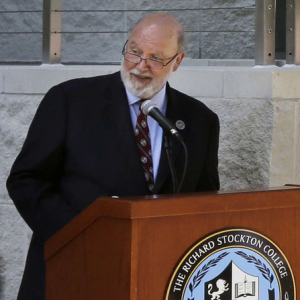A four-month probe into Stockton University’s $18 million purchase of the closed Showboat casino in Atlantic City assigned blame to several parties for the failed real estate deal. Despite spending hundreds of thousands of dollars a month to maintain the property, the college is unable to use the casino for its intended purpose.
When Stockton bought the Showboat, its board’s intentions were to turn the old casino into a satellite campus. An obscure law barred the property from being used as an educational facility. Students protested the casino mogul who kept their proposed new school from being opened, but months later, Stockton is still left with a property it cannot use.
One maddening note from the investigation report is that then-President Herman Saatkamp knew about the law prior to closing on the property, yet forged ahead with the purchase in full knowledge of his school’s shaky legal ground. In the end, the report found that responsibility lied with Saatkamp, Stockton’s lead counsel, and Caesars Entertainment.
Gibbons PC Investigation
The investigation, which was conducted by the Gibbons P.C. law firm, found that Saatkamp’s rush to make the deal led to a number of serious oversights. The report said his “leadership style, and haste to obtain approval of the deal, hampered debate.” This resulted in the Stockton University’s board of trustess “not learning of critical facts.”
In conclusion, the report stated, “Ultimately, the ill-fated purchase of the Showboat by Stockton, and the ensuing developments, were the result of a confluence of facts, risks, and personalities that culminated in a transaction that, with the benefit of 20-20 hindsight, was certainly unwise.”
1988 Covenant
A major flaw kept the Showboat from being a realistic option for use as the satellite campus. A 1988 agreement stated that the Showboat could not be used as anything but a casino.
Herman Saatkamp did not relate this fact to the board of trustees, which was made clear in the report, which was released on Thursday. It said, “He [Saatkamp] was well aware of that covenant, albeit satisfied that it ought not preclude the closing.”
Did Not Inform the Board
Apparently, the former school president learned that the Trump Taj Mahal was going to enforce the 1988 covenant after he had gained approval from the board, but before the land deal had closed. Instead of informing the board, he went ahead and closed on the purchase.
In a release statement, Herman Saatkamp said he had the deep belief he “acted in the best interest of the University and the citizens of New Jersey.”
Saatkamp added that he was “deeply disappointed“, because the report had a “lack of emphasis on the failure of Stockton’s outside counsel, which the Board and I relied upon, to fully disclose significant legal problems with the real estate agreement.”
Stevan Sandberg Received Blame
The investigators did place blame with Stevan Sandberg of Florio Perrucci Steinhardt & Fader, who was the lead counsel on the deal. The report said Sandberg did not see it as unwise to close on the deal. Also, he failed to disclose to his clients that he is not admitted to practice law in New Jersey.
Timothy White, a spokesman for Steinhardt & Fader, said “we disagree with some conclusions as they relate to our Firm and its services.”
Report Blames Caesars Entertainment
Blame also falls on Caesars Entertainment, because the investigation showed that it implied that a waiver was forthcoming from the Trump Taj Mahal, which would have had to sign-off on any such waiver. The Trump Taj Mahal, which was undergoing a bankruptcy process and a change in ownership at the time, never gave that signal.
The report concluded, “If true, those misrepresentations [by Caesars] represent the starting point for this episode: without them, the events described in this report would not have occurred.”
Caesars Statement on the Report
Katie Dougherty, a spokesperson for Caesars Entertainment, disputed those claims in the Showboat report. She said, “All parties to the Stockton-Showboat transaction and their counsel were operating with full knowledge of the status of title to the Showboat property,” then explained that any suggestion Caesars was “less than forthright in the course of the Stockton-Showboat transactions is simply false.”
Next Wednesday, the Stockton board is set to have a closed door meeting, at which times its members are expected to be informed in greater detail about the report. Madeleine Deininger, the Chair for Stockton’s board, said in a statement this week, “As a Board of Trustees we need to understand this background so that we can put processes in place that will avoid mistakes of this nature going forward.“

